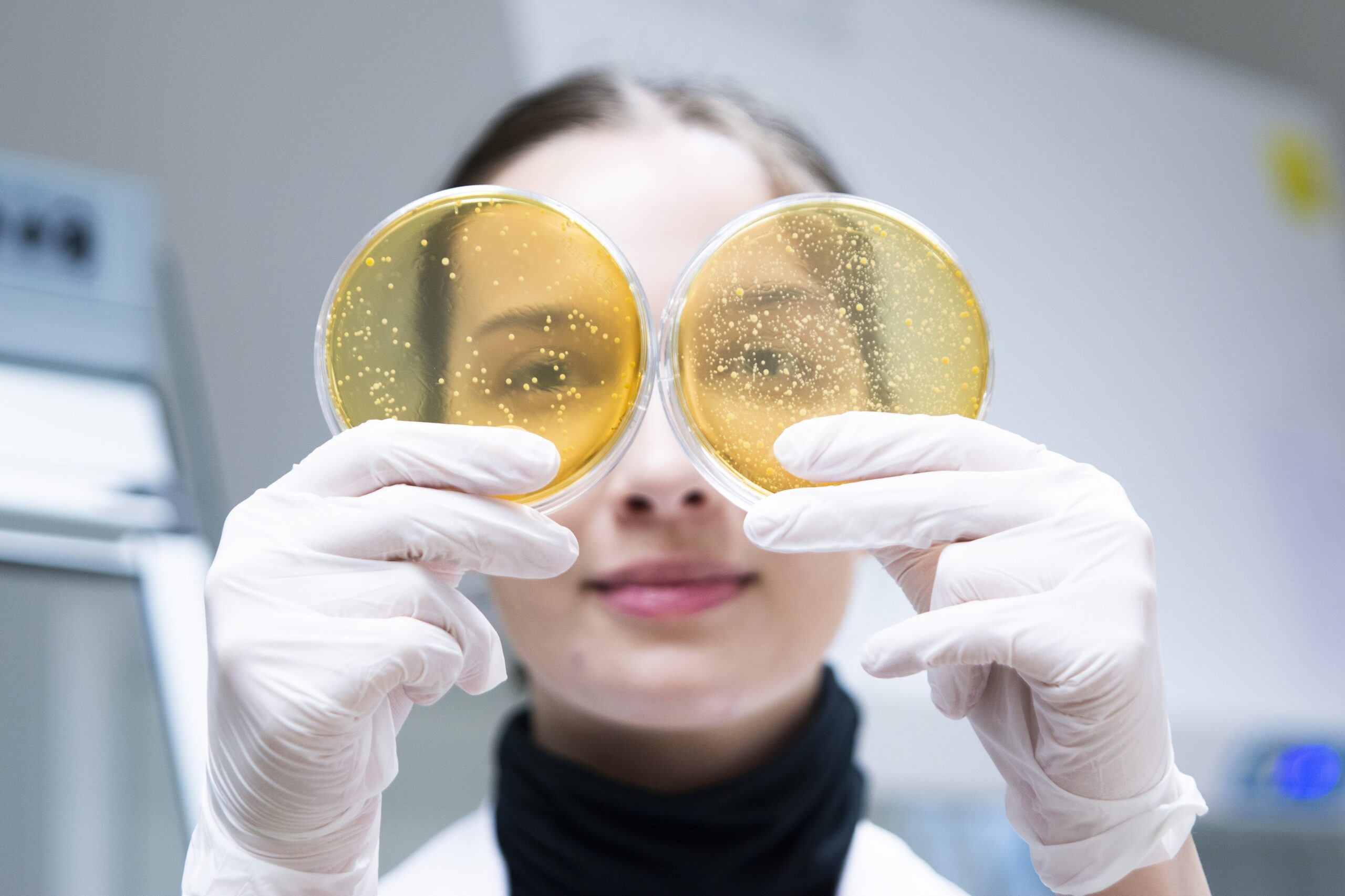How does a bacterium become a probiotic?

Probiotics are living microbes of human origin, the use of certain numbers of which has a positive impact on human health. Probiotics are mostly lactic bacteria:
- lactobacilli,
- bifidobacteria,
but several other microorganisms are also used. It should be remembered that not all lactic bacteria are probiotics, in other words, probiotics are not synonymous with lactic acid bacteria.
The development of the microbe into a probiotic and the scientific evaluation of its health effects are carried out on the basis of international guidelines i.e. the effects and safety of the microbial strain must be scientifically proven to be a probiotics at all.
Bacterium isolation
Potential probiotics – candidates are selected mostly from a healthy person, including a child from a normal microbial community, in the case of oral probiotics from the intestine. This ensures not only safety but also the microbial premise to pass through the upper parts of the gastrointestinal tract viable and reach a specific area of action specific to the probiotic (usually the lower part of the small intestine or the large intestine). The amount of live microbes that reach their destination is essential to the health effect. Probiotics should therefore be resistant to the effects of stomach acid, bile and other digestive enzymes.
Safety
The safety of food supplements and food-in-use microbes is of paramount importance. Some microbes (lactobacilli, bifidobacteria, lactoctoks, etc.) whose use in the food industry has proven their safety have been given a ‘presumed safe status’. Nevertheless, a thorough testing is needed of the safety of each microbe developed for probiotics, including:
- lack of trans-carrier antibiotic resistance;
- lack of certain properties that may give the microbe the ability to cause disease (virulence factors);
- production of potentially harmful metabolic products, etc.
The safety of the microbial strain shall be tested in the test tube and in laboratory animals. Safety and potential adverse reactions are evaluated in a clinical study in healthy subjects in volunteers.
Technological aptitude
Since the probiotic must remain viable during technological handling and the shelf-life of the product, it is also important to identify the microbe’s nutritional and temperature preferences, growth rate, etc., increased cultureability and the stability of the dry culture obtained by freeze-drying.
Clinical trials
The impact of probiotic microbes on human health parameters shall be tested in a thoroughly planned scientific clinical trial with different test schemes in the light of good clinical practice, which must be pre-recorded in international databases in order to ensure transparency.
The health effects of a probiotic microbe shall be investigated in double-blind or open impact studies with different length and test regimens (transition or parallel shoulders).
Laboratory tests shall test its biochemical and physiological properties and establish a genetic background to determine the microbial mechanisms of action.
Health benefits
Decades of research have shown a number of positive effects on human health when using probiotics on a scientific basis:
- alleviating lactose intolerance and food allergies,
- lowering cholesterol in the serum,
- lowering blood pressure;
- maintaining the microbiological balance of the gastrointestinal tract – restoration,
- prevention of diarrhoea,
- disorders of non-infectious intestinal infections (e.g. irritable bowel syndrome),
- moderate stimulation of the immune system,
- reducing the risk of cancer-like formations,
- antioxidant activity and reduction of oxidative stress,
- oral health,
- prevention and alleviation of urinary and genital tract infections, etc.
Some of the above characteristics are specific to the majority of probiotics, in particular digestive and intestinal health aspects. The properties identified (e.g. lowering cholesterol or blood pressure, antioxidant activity) are strain-specific, so not all probiotics have these characteristics.
Nordwise® probiotic supplements
As a result of years of and ongoing research and development, researchers from BioCC OÜ, a company based in Tartu, have developed patented beneficial probiotic lactic bacteria in cooperation with researchers from the University of Tartu.
BioCC brand Nordwise® supplements contain these patented beneficial bacteria and vitamins that support the specific health effects of the probiotic microbial strain.
Today, the following food supplements from Nordwise, invented and produced in Estonia® have entered the market:
- PlantaBif® (contains Lactobacillus plantarumTENSIA®, Lactobacillus plantarumINDUCIA®, Lactobacillus plantarum MCC1, Bifidobacterium longum, Bifidobacterium infantumis.
2. Joint health and digestion supporting Flexellent® (contains lactic acid bacteria Lactobacillus plantarum INDUCIA®, Lactobacillus plantarum MCC1, BiovaFlex® (egg-huing hydrolysate), vitamin K2MK7 (menaquinone-7), vitamin D3 (cholecalciferol)).
3. hematopoietic and digestive-supporting Women+ (contains lactic acid bacteria Lactobacillus plantarumINDUCIA® and Lactobacillus plantarum TENSIA®, B9, B12 vitamins, iron, vitamin D3 and vitamin K2MK7).
Author: Epp Songisepp PhD, Senior Research Fellow at BioCC
